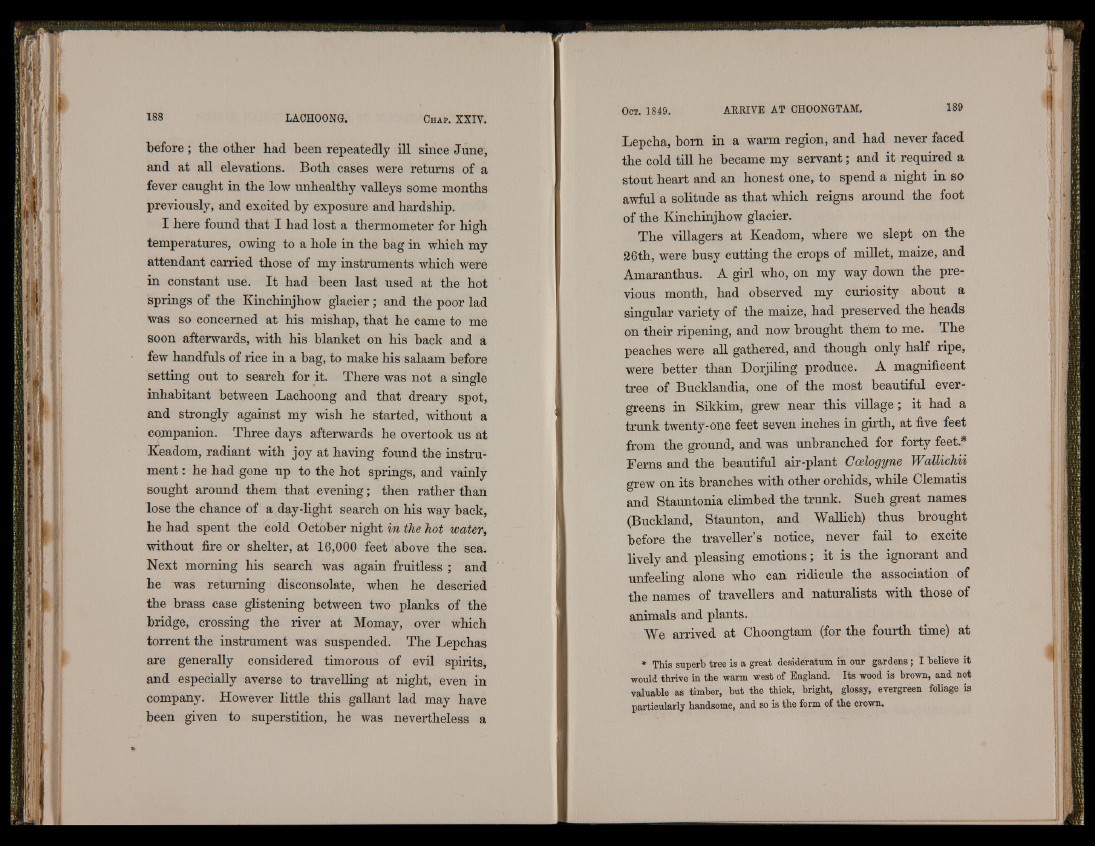
before; the other had been repeatedly ill since June,
and at all elevations. Both cases were returns of a
fever caught in the low unhealthy valleys some months
previously, and excited hy exposure and hardship.
I here found that I had lost a thermometer for high
temperatures, owing to a hole in the bag in which my
attendant carried those of my instruments which were
in constant use. I t had been last used at the hot
springs of the Kinchinjhow glacier; and the poor lad
was so concerned at his mishap, that he came to me
soon afterwards, with his blanket on his back and a
few handfuls of rice in a bag, to make his salaam before
setting out to search for it. There was not a single
inhabitant between Lachoong and that dreary spot,
and strongly against my wish he started, without a
companion. Three days afterwards he overtook us at
Keadom, radiant with joy at having found the instrument
: he had gone up to the hot springs, and vainly
sought around them that evening; then rather than
lose the chance of a day-light search on his way hack,
he had spent the cold October night in the hot water,
without fire or shelter, at 16,000 feet above the sea.
Next morning his search was again fruitless ; and
he was returning disconsolate, when he descried
the brass case glistening between two planks of the
bridge, crossing the river at Momay, over which
torrent the instrument was suspended. The Lepchas
are generally considered timorous of evil spirits,
and especially averse to travelling at night, even in
company. However little this gallant lad may have
been given to superstition, he was nevertheless a
Lepcha, born in a warm region, and had never faced
the cold till he became my servant; and it required a
stout heart and an honest one, to spend a night in so
awful a solitude as that which reigns around the foot
of the Kinchinjhow glacier.
The villagers at Keadom, where we slept on the
26th, were busy cutting the crops of millet, maize, and
Amaranthus. A girl who, on my way down the previous
month, had observed my curiosity about a
singular variety of the maize, had preserved the heads
on their ripening, and now brought them to me. The
peaches were all gathered, and though only half ripe,
were better than Dorjiling produce. A magnificent
tree of Bucklandia, one of the most beautiful evergreens
in Sikkim, grew near this village; it had a
trunk twenty-one feet seven inches in girth, at five feet
from the ground, and was unbranched for forty feet.*
Ferns and the beautiful air-plant Coelogyne Wallichii
grew on its branches with other orchids, while Clematis
and Stauntonia climbed the trunk. Such great names
(Buckland, Staunton, and Wallich) thus brought
before the traveller’s notice, never fail to excite
lively and pleasing emotions; it is the ignorant and
unfeeling alone who can ridicule the association of
the names of travellers and naturalists with those of
animals and plants.
We arrived at Choongtam (for the fourth time) at
* This superb tree is a great desideratum in our gardens; I believe it
would thrive in the warm west of England. Its wood is brown, and not
valuable as timber, but the thick, bright, glossy, evergreen foliage is
particularly handsome, and so is the form of the crown.